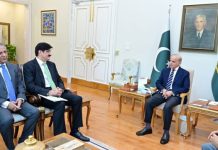ISLAMABAD: Information Minister Fawad Chaudhry shared that Chief of Army Staff (COAS) General Qamar Javed Bajwa, during Prime Minister Imran Khan’s visit to GHQ yesterday, had said in categorical terms that like other institutions, the army too is a subordinate institution of the government.
Speaking to reporters outside the Parliament House, Chaudhry informed that COAS General Bajwa said the army is bound to implement policies framed by the civilian government.
The army top brass briefed the Prime Minister and federal ministers on important security and defence-related issues during the GHQ visit, Chaudhry said.
Chaudhry added that Prime Minister Imran Khan during the GHQ visit said it was necessary for all institutions to formulate a joint strategy to overcome major challenges facing the country.
“For the first time in the country’s history that all institutions are on the same page. We are hopeful that in the future Pakistan’s issues will be resolved.”
 The info minister said that policy-making is the privilege of the elected government but it has to bring all stakeholders on board in order to formulate policies.
The info minister said that policy-making is the privilege of the elected government but it has to bring all stakeholders on board in order to formulate policies.
“It is the job of the government to make the policy. The government is also responsible to make sure that all institutions are stakeholders when the policy is made. The difference between PTI policy and that of previous governments would be that ours will not be personal,” Chaudhry said.
The information stressed that policies under the previous government were made on the basis of Nawaz Sharif’s relationship with Indian Prime Minister Narendra Modi, Turkish President Recep Erdogan and the Chinese president. “State policies are not made this way. State polices are those in which there is input from all institutions, parliament and has the support of the people.”
‘Pakistan wants to strengthen relations with neighbours’
Fawad Chaudhry said Pakistan desires to further strengthen its ties with its neighbours, and emphasised the need for peaceful relations with India.
“We want peace with India, We are two nuclear nations. We can either wage war or have an agreement to wage a war against poverty. The normalisation of relations with India is an important agenda,” he said.
Pakistan wants stability in Afghanistan and normalisation of ties with India, which remains an important agenda of the government, he said, adding that instead of confrontation, Pakistan and India should join hands to fight their common enemy of poverty.
The minister noted that Saudi Arabia is a strategic partner of Pakistan, and the country also wants to maintain good relations with Iran, United States and the Russian Federation.
He said the dream of Prime Minister Imran Khan to lift people out of poverty cannot be realised without increased interaction with Central Asian Republics.
About China, Chaudhry said the China-Pakistan Economic Corridor (CPEC) serves as a geo-economical pact between the two countries. He reiterated that the government is committed to complete CPEC projects.
There are energy projects worth $22 billion besides infrastructure projects worth $6 billion under the CPEC, he shared, adding that projects worth Rs42 billion have yet to be undertaken under the pact.
‘Cancellation of blasphemous contest a diplomatic success for Pakistan’
On Dutch anti-Islam lawmaker Geert Wilders cancelling a blasphemous caricatures contest, Chaudhry said the development was a diplomatic success for Pakistan.
“Pakistan responded to the issue with cooperation from Turkey and other members of the Organisation of Islamic Cooperation,” he said, adding that there was a need for a global strategy to tackle issues such as these.
Chaudhry pointed out that the government of Netherlands was not in favour of the competition. Majority of people in the Western world were against the blasphemous caricatures, he said, adding that the controversial contest injured sentiments of over two billion Muslims and therefore, laws should be framed against such actions.
He said PM Imran has directed Foreign Minister Shah Mahmood Qureshi to raise the issue at the United Nations.



